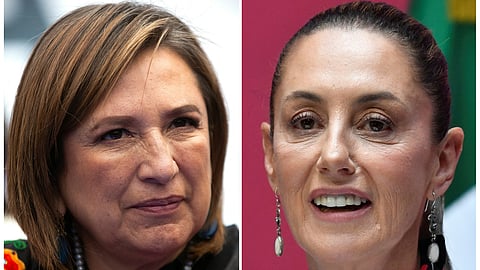

FRESNILLO: Campaigning officially began Friday for elections likely to produce Mexico's first woman president—a watershed for a nation with a long tradition of macho culture.
Opposition candidate Xochitl Galvez launched her campaign after the stroke of midnight in one of Mexico's most dangerous states, seeking to tap into voter concerns about the country's rampant violence.
Public opinion polls suggest that she faces a tough battle against ruling party candidate Claudia Sheinbaum, a former Mexico City mayor and close ally of outgoing President Andres Manuel Lopez Obrador.
With three months to go before the June 2 vote, Sheinbaum, a 61-year-old scientist by training, enjoys a significant lead with 63 percent support, according to an average of polls compiled by the Oraculus research firm.
Galvez, also 61, has 31 percent support, while Jorge Alvarez, 38, of the Citizens' Movement party, is a distant third with just five percent, polls show.
At stake is the future of Latin America's second-largest economy, a country of 126 million people that is a key trading partner of the United States and a major tourist destination but faces huge challenges from illegal migration and drug-related violence.
Sheinbaum is due to address supporters on Friday afternoon in Mexico City's main square, the heart of the city she governed from 2018 until last year, when she stepped down to run for president.
'People are afraid'
Galvez, an outspoken businesswoman with Indigenous roots, sought to put the focus on the country's insecurity with a night-time rally in the city of Fresnillo in the violence-wracked state of Zacatecas.
She led a candle-lit march through the streets before sharing the stage with a relative of one of Mexico's more than 100,000 missing persons, holding a minute's silence for victims of violence.
"Here in Fresnillo, as in all of Mexico, people are afraid," Galvez said, hitting out at Lopez Obrador's "hugs, not bullets" strategy to tackle violent crime at its roots by combating poverty and inequality rather than using military force.
"Hugs for criminals are over," she said.
"To have a Mexico without fear, we're going to restrain the most violent and aggressive criminal organisations in our country," she added.
It was the first of several planned stops in cities considered by their residents to be among the most unsafe in Mexico, to highlight what Galvez says is the government's failure to tackle spiralling violence.
Nearly 450,000 people have been murdered across Mexico since 2006, when then-president Felipe Calderon launched a controversial anti-drug military campaign, according to official figures.
Underscoring the challenges facing security forces, a military patrol was ambushed Thursday with explosives while tracking down a criminal group in the western state of Michoacan, leaving four soldiers dead and nine injured, the government said.
'Formidable party machinery'
Sheinbaum is a staunch supporter and confidant of Lopez Obrador, a left-wing populist who enjoys an approval rating of nearly 70 percent, according to Oraculus, but who is required by the constitution to leave office after one term.
The granddaughter of Bulgarian and Lithuanian Jewish migrants, Sheinbaum, has vowed to continue the policy agenda of Lopez Obrador, known by his initials AMLO.
"Sheinbaum is in a very strong position, with a significant lead in the polls over Galvez," analyst Michael Shifter of the Inter-American Dialogue think tank in Washington told AFP.
"Although nothing is impossible in politics, with just over three months to go before the election, it is highly unlikely that Galvez will be able to gain enough ground to make it a competitive race. AMLO is too popular, and the government and party machinery is too formidable," he added.
On the eve of her campaign launch, Sheinbaum said that her opponents were "looking for a way to rise in the polls, but there is no way they can do it because we represent the future, and they represent the past."
Galvez represents an opposition coalition made up of the Institutional Revolutionary Party, which ruled the country for more than 70 years until 2000, the conservative National Action Party and the leftist Party of the Democratic Revolution.
But her background sets her apart from the traditional conservative opposition: she wears Indigenous clothing, uses colloquial language peppered with profanity and is known for travelling around Mexico City by bicycle.